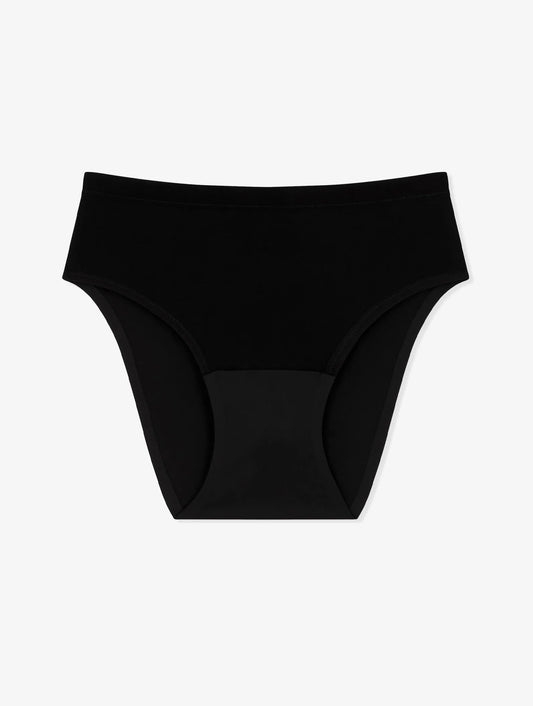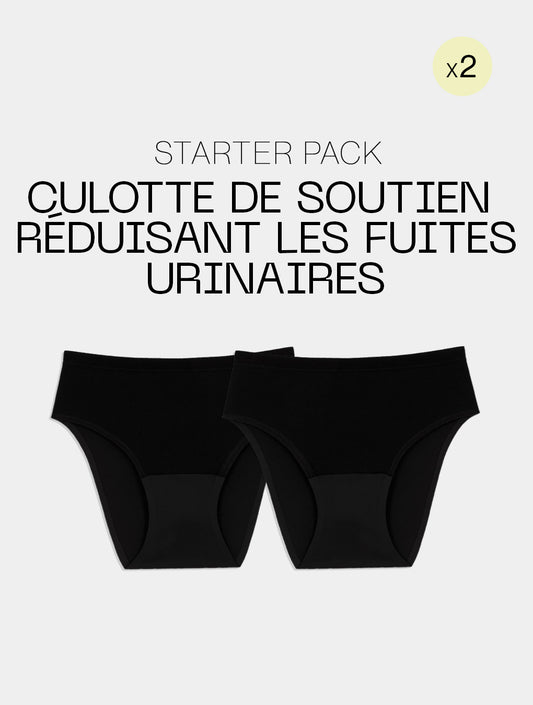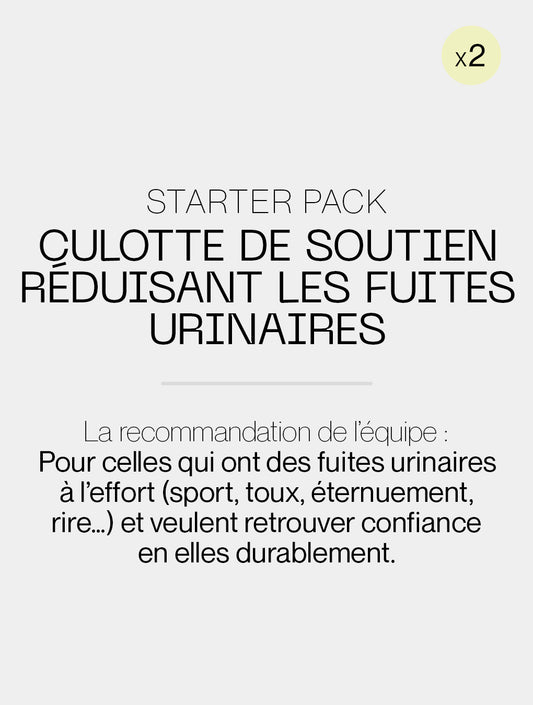Urinary leaks in young women: causes and solutions
Urinary leakage in young women is not uncommon and can result from a variety of causes, ranging from stress incontinence to bladder instability. Factors such as lifestyle, pregnancy and smoking can also play a role. Fortunately, there are solutions to manage and treat this problem.

Understanding urinary incontinence in young women
Urinary incontinence in young women can be a source of embarrassment and discomfort. Although this condition is often associated with older adults, it can affect women at any age. Several factors can contribute to urinary incontinence in young women, including physical factors such as:
- obesity
- diabetes
- and certain neurological diseases.
Lifestyle factors, such as smoking, can also increase risk. Furthermore, pregnancy and childbirth, particularly in cases of multiple pregnancy or difficult childbirth, can cause urinary incontinence.
Anti-leak pants for young women?
For young women suffering from urinary leakage, the use of Anti-urinary leakage panties can be a discreet and effective solution for young women to manage this problem on a daily basis . These panties, which are actually support panties, are innovative and can be washable and reusable, thus offering an ecological and economical alternative to disposable protections.
Just like menstrual panties for teenagers , they offer protection against leaks, neutralize odors and keep you dry. Made from soft and comfortable materials, they come in different cuts and models, adapted to each body shape and needs.
What is urgency in young women and its impact on incontinence
Imperiousness, or urinary urgency, is characterized by a sudden and irrepressible need to urinate, which can lead to urine leakage. This phenomenon is caused by abnormal contractions of the bladder while it is filling, even when it is not completely full.
Urge has a significant impact on incontinence, particularly urge incontinence. This type of incontinence, which results from an overactive bladder, is marked by frequent and often unpredictable urination. Young women suffering from urgency may have difficulty reaching the toilet in time, leading to urinary leakage.
There are medical treatments and pelvic-perineal rehabilitation techniques to manage urgency and reduce its impact on incontinence.
Loss of urine in young women: a common problem
Problems related to stress incontinence in young women
Stress incontinence in young women is characterized by involuntary urinary leakage during physical exertion, such as sports, laughing, coughing, or even changing position.
This type of incontinence represents 40% of cases of urinary incontinence. It is mainly due to a relaxation of the muscles of the perineum and the muscle that closes the bladder . Several factors can cause this relaxation:
- History of pelvic surgery
- Obesity
- Repeated pregnancies and childbirths
Solutions exist to treat stress incontinence, including perineal rehabilitation to strengthen the pelvic floor muscles.
Nocturnal incontinence in young women: sleep disorders
Nocturnal incontinence , or enuresis, manifests itself as urinary leakage during sleep. This can greatly disrupt the quality of sleep and cause significant daytime fatigue, thus affecting the well-being and quality of life of the young women concerned.
This phenomenon may be due to an overactive bladder, marked by involuntary bladder contractions. Another factor that may contribute to a young woman's nighttime incontinence is excess urine production during the night, or nocturia.
Perineal rehabilitation, adapting fluid consumption habits before bedtime and using specific nighttime protection are all solutions that can help manage nighttime incontinence.
It should also be noted that nighttime incontinence can be a symptom of other medical conditions for a young woman, such as diabetes or a urinary tract infection, so it is recommended to consult a healthcare professional if there is persistent nocturnal urinary leakage.
How to stop urinary leakage in women around 20 years old?
To stop urinary leakage in a woman around the age of 20, several options are available to you.
- Kegel exercises , for example, can help strengthen your pelvic floor muscles and reduce leakage.
- Lifestyle adjustments , such as reducing caffeine and alcohol consumption, quitting smoking, or adopting a balanced diet can also help improve symptoms.
In the event of persistent urinary leakage in young women despite these measures, a medical consultation may be necessary to consider other treatments. These may include:
- medication
- perineal rehabilitation
- or, in some cases, incontinence surgery .
It is essential to remember that each woman is unique and that the most effective solution will depend on individual characteristics and the type of incontinence encountered.
Specific protection, such as incontinence pants, can also be used in addition to treatments to better manage daily life.
Why does urine flow by itself in a young woman?
Urine can flow on its own in a young woman for various reasons. One of the most common factors is a urinary tract infection . Indeed, the female urethra being very short, it is more exposed to the risk of contamination by digestive germs.
Furthermore, poor diet (common among young girls and young women), chronic constipation or regular taking of certain medications can also cause urinary leakage.
In some cases, urine can flow on its own in young women due to urge urinary incontinence , which is characterized by a need to urinate so urgently that it does not give time to reach the bathroom.

The causes of urinary leakage in young women
Impact of pregnancy and childbirth on incontinence
Pregnancy and childbirth can have a significant impact on urinary incontinence. Indeed, during a young woman's pregnancy, hormones cause muscles and ligaments to relax , including those that support the bladder and uterus. This can lead to stress incontinence during pregnancy , characterized by urinary leakage during coughing, laughing or physical activity.
Furthermore, childbirth, especially vaginally, can damage the nerves and muscles of the pelvic floor, making bladder control more difficult. The incidence of urinary incontinence is also higher among young women who have given birth vaginally.
Finally, the weight of the uterus which increases during pregnancy puts additional pressure on the bladder, which can cause urinary leakage in a woman around the age of 20.
Influence of a young woman's lifestyle on urinary incontinence
Other causes of urinary incontinence in a young woman? The lifestyle of a 20-year-old woman can also influence the onset of urinary incontinence. Healthy lifestyle habits can help manage and prevent urinary leakage.
-
An important aspect concerns hydration . Ensuring proper hydration while avoiding excessive fluid intake before bed is essential to reduce the risk of nighttime incontinence.
-
Alcohol and caffeine consumption also seem to play a role in young women. Both of these substances are diuretics, therefore increasing urine production and potentially the risk of leaking. Limiting their consumption can be beneficial.
-
Finally, being overweight is a risk factor for urinary incontinence. It can increase pressure on the bladder and pelvic floor muscles, promoting leaking.
-
Thus, a balanced diet and regular physical activity can contribute to the prevention of urinary incontinence in young women.
In all cases, these lifestyle modifications should be considered in addition to appropriate medical care.
The role of smoking and alcohol in urinary leakage in young people
Smoking and alcohol consumption are two significant risk factors for urinary leakage in young people.
Tobacco is known to cause coughing fits, which can increase pressure on the bladder and lead to urinary leakage. Additionally, tobacco use can also negatively impact urinary tract health , increasing the risk of incontinence in young women.
As for alcohol, it is recognized as a diuretic, increasing urine production and can thus cause an overactive bladder. This is a risk factor for the appearance of urinary leakage in young women. It is therefore recommended for young women with urinary leakage to moderate their consumption of alcohol and tobacco to better manage their incontinence.
Treatment of urinary incontinence in young women
When to consult a urologist for urinary incontinence?
It is recommended to consult a urologist as soon as symptoms of urinary incontinence appear, whether occasional or persistent. Consultation is all the more necessary if urinary leakage is accompanied by burning or discomfort during urination .
A consultation can also be considered in the presence of vaginal dryness in young women . If the leaks are linked to urgency (urgent and irrepressible need to urinate), it is possible that the general practitioner will be able to treat the young patient.
However, a consultation with a urologist may be necessary for a more complete assessment , potentially including a urodynamic assessment, cystoscopy or pelvic ultrasound.
The different treatment options for incontinence in a girl or young woman
There are different options for treating urinary incontinence in young women. One of the first solutions considered is perineal rehabilitation . This technique strengthens the pelvic floor muscles, helping to better control urination.
Another option often given to young girls is behavioral rehabilitation , which involves lifestyle changes, such as adjusting fluid intake or learning to empty the bladder at set times.
Medications are also used to treat incontinence in young women , particularly in cases of urge incontinence.
Finally, if other treatments fail, surgery may be considered. For example, placing a sling under the urethra is an option to support weakened pelvic floor tissues.
It is essential to discuss with your doctor to choose the most suitable treatment.
Natural solutions to combat urinary leakage
To naturally combat urinary leakage, there are several options to consider and are often popular with young women.
Reflexology , acupuncture and osteopathy can be complementary solutions to medical treatments.
A real grandmother's remedy against incontinence in young women, the use of certain plants and essential oils can also be beneficial. For example, cinnamon , in the form of herbal tea or chewed, seems to be an ally against urinary incontinence.
Evergreen cypress essential oil (Cupressus sempervirens) may also help, although it is not recommended for children under 6 years old.
Finally, food supplements based on natural active ingredients can help reduce urinary leakage in young girls or young women.
However, it is advisable to consult a health professional before starting any natural treatment.
Urinary incontinence among young women in France: data and statistics
In France, urinary incontinence affects a large number of women of all ages. Around 3 million women are affected, which equates to one in five women suffering from stress urinary incontinence.
Studies show that this problem is particularly prevalent among young women (under 30) with 12% of them affected .
Urinary incontinence may also increase with age. For example, 25% of women aged 60 to 69 suffer from incontinence.
However, it is important to note that many people do not consult for this reason, considering urinary incontinence as a natural consequence of aging.
How many young women aged around 20 have urinary leakage?
Urinary incontinence in young women around the age of 20 is more common than you might think. Indeed, according to Urofrance, 20 to 30% of young girls can suffer from it . This can affect young girls in their daily lives, with urinary leakage often going unnoticed.
A study carried out by Professor Faussat on young girls aged 16 to 20 in schools indicates that 8.5% of young girls leak urine during PE lessons .
Furthermore, another study mentions that nearly 10% of young nulliparous women (i.e. who have never given birth) are affected, but this figure can rise to 30% when they are very athletic .
Dealing with urinary incontinence: practical advice for young women
To deal with urinary incontinence, practical advice can be adopted on a daily basis. First of all, good hydration is crucial for young girls . It is advisable to avoid diuretic drinks like coffee and alcohol which can increase urine production and pressure on the bladder.
Adopting a “voiding schedule” can also help young women understand their bladder habits. Noting urination schedules, urine volume, and beverages consumed can offer insight into potential incontinence triggers.
Regularly doing exercises to strengthen the pelvic floor can improve bladder control and reduce urinary leakage.
In case of an urgent need to urinate, young women are advised not to run to the toilet but to sit on a hard seat to hold the urine, breathe deeply and tense the pelvic floor muscles.
Finally, the use of appropriate protection can also provide comfort in the daily management of incontinence: this is particularly the case with the support panties that Smoon offers to teenagers and young women!




